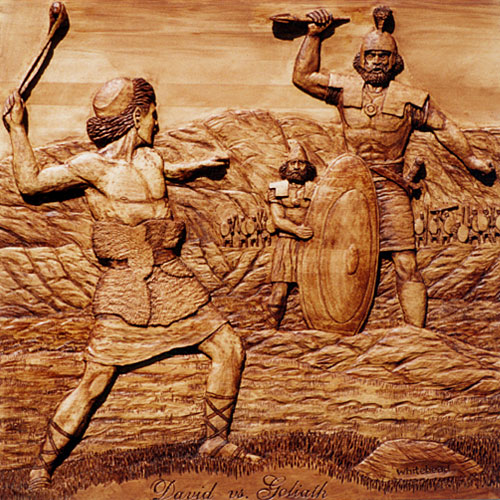Goliath and David
by Robert Graves (pub 1916)

Once an earlier David took
Smooth pebbles from the brook:
Out between the lines he went
To that one-sided tournament,
A shepherd boy who stood out fine
And young to fight a Philistine
Clad all in brazen mail. He swears
That he’s killed lions, he’s killed bears,
And those that scorn the God of Zion
Shall perish so like bear or lion.
But the historian of that fight
Had not the heart to tell it right.Striding within javelin range
Goliath marvels at this strange
Goodly-faced boy so proud of strength.
David’s clear eye measures the length;
With hand thrust back, he cramps one knee,
Poises a moment thoughtfully,
And hurls with a long vengeful swing.
The pebble, humming from the sling
Like a wild bee, flies a sure line
For the forehead of the Philistine,
Then… but there comes a brazen clink,
And quicker than a man can think
Goliath’s shield parries each cast,
Clang! clang! and clang! was David’s last.
Scorn blazes in the Giant’s eye
Towering unhurt six cubits high.
Says foolish David, “Damn your shield,
And damn my sling, but I’ll not yield.”He takes his staff of Mature oak,
A knotted shepherd-staff that’s broke
The skull of many a wolf and fox
Come filching lambs from Jesse’s flocks.
Loud laughs Goliath, and that laugh
Can scatter chariots like blown chaff
To rout: but David, calm and brave,
Holds his ground, for God will save.
Steel crosses wood, a flash, and oh!
Shame for Beauty’s overthrow!
(God’s eyes are dim, His ears are shut.)
One cruel backhand sabre cut –
“I’m hit, I’m killed,” young David cries,
Throws blindly forward, chokes… and dies.
And look, spike-helmeted, grey, grim,
Goliath straddles over him.
One of the problems with trying to grasp the experience of the First World War is the sheer immensity of scale. How could people respond appropriately to so much devastation, so many deaths?
How did individual soldiers dealing with the constant threat of death, the death of their friends, the dead they pushed past in the trenches, slept next to, felt floating in the mud they waded through, heard hanging on the wire, saw piled up in No Mans land, not go mad?
It is tempting to believe that the only way they could protect themselves must have been to become completely numb to any normal human grief to cope at all.
The first hand accounts give very little suggestion of this, however.
These men and boys, plucked from ordinary, decent, peaceful lives, seemed somehow to continue with them despite the surreal surroundings they found themselves in.
On all sides of the conflict, they make tea, talk, write letters home, complain about sore feet and lice and colds, as if while their surroundings have metamorphosized, they have not; they cling to normal lives continued with a few bizarre interruptions in their normal paths.
And they have not deadened all feeling towards their friends; quite the opposite. The love they felt for their comrades seemed to intensify, to concentrate; amidst all the carnage, they cherished the people around them all the more because of their vulnerability; if the one or two people they really loved were still there, they could survive. If they died, all hope and resilience went with them. It was not the vast numbers of casualties which appalled them; it was individual, precious lives lost.
It seemed appropriate to us to focus, therefore, on a single death which was obviously of great significance to Graves.
He does not tell us very much about David Thomas. We know he was from South Wales, ‘simple, gentle, fond of reading’. Siegfried Sassoon was clearly deeply in love with him; Graves was friend to both of them; he talks about the three of them ‘going about together’. David must have had a rare quality as a human being to have been so valued by two such men.
David was injured when they were all deployed at various stations along the line; they got the news that he had been hit in the throat but had walked to the dressing station and were delighted that he was safe out of it, but then they heard that he had unexpectedly choked and died in front of a doctor who could not save him, just after he had given someone a letter for a girl in Glamorgan.
Sassoon went mad with grief and vented his fury at the Germans.
This poem was Graves’ response, and is interesting at many levels.
He distances himself from the immediate grief by cloaking it in the biblical story of David and Goliath; but of course the inversion of the title makes his intention clear.
The great tale of David defeating Goliath taps in to countless such stories of heroic men, who, through, wit, bravery, prowess or courage, defeat terrible enemies. Perhaps Macaulay expressed the heroic sensibility best:
Then out spoke brave Horatius, the Captain of the Gate:
“To every man upon this earth, death cometh soon or late;
And how can man die better than facing fearful odds,
For the ashes of his fathers, and the temples of his Gods..
We really need heroes. Puny little humans faced with all kinds of huge threats need to believe that there are those amongst us who are truly powerful because they have brave hearts– and we did used to believe that.
This poem I believe pinpoints the end of that belief; and the despair that that end entails.
The beauty and strength and courage of valiant young David meant nothing against Goliath because Goliath had superior firepower.
Courage meant nothing anymore against tanks, or relentless fire. Beautiful young warriors died as easily as weak cowards; human beings themselves finally defeated by the machine. It is interesting that modern heroes tend to be machines themselves, with more than human powers.
Graves was mourning both losses.
